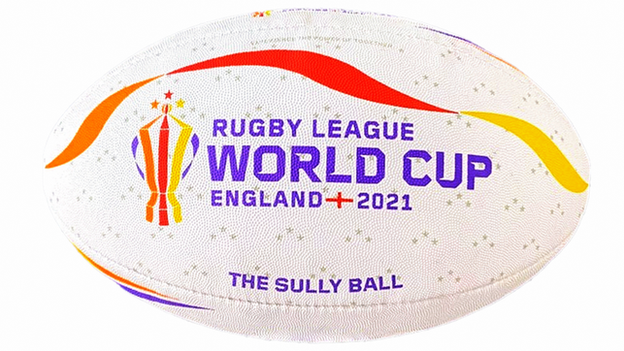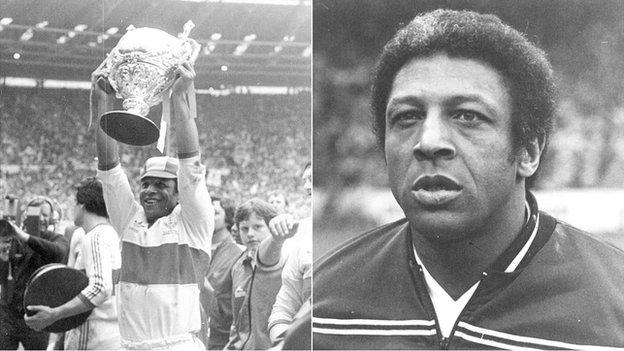Rugby League World Cup: Clive Sullivan - Rugby league legend
- Published
GB captain Clive Sullivan scores wonder try in 1972 final
Clive Sullivan: Rugby League Legend |
|---|
Date: Wednesday, 12 October Time: 22:40 BST |
Coverage: Live on BBC One Wales and the BBC Sport website and app; repeated on BBC One Wales at 23:35 BST on Sat, 15 Oct and BBC Two network at 21:30 BST on Fri, 21 Oct, and available on demand on the BBC iPlayer. |
Every pass, every kick and every play-the-ball in the forthcoming Rugby League World Cup will honour the name of Clive Sullivan.
The former winger is so respected in the sport that the official match ball for the tournament that kicks off in England this month has been named the "Sully Ball", and every pair of hands it passes through will add a small homage to an extraordinary career.
Yet even though Sullivan is revered by the game he loved and is an icon in Hull - where he played for both Hull Kingston Rovers and Hull FC - he remains relatively unknown in his home country of Wales.
With both the World Cup and Black History Month taking place in October, it is an opportunity to celebrate one of the sport's greatest trailblazers in a new documentary - Clive Sullivan: Rugby League Legend, which will air on BBC One Wales on Wednesday, 12 October at 22:40 BST.

All three Rugby League World Cup finals are to be held in Manchester in November 2022.
Former Wales footballer and Sullivan's nephew, Nathan Blake, uncovers the incredible story of a man he calls "an absolute hero", who inspired his whole family and countless others.
"His achievements were outrageously good... a true icon in the north of England, but in Wales - the country he loved - few people know his name," said Blake, a former striker capped 30 times by Wales.
"Clive Sullivan's is an incredible story and one I never truly understood. Why would a little boy who dreamt of playing rugby union for Wales end up leaving his family to go north?"
Sullivan was a true trailblazer, breaking down barriers as the first black sportsman to captain a British national team as he guided Great Britain to triumph in the 1972 Rugby League World Cup.
He led from the front in the final against Australia,, external scoring a superb individual length-of-the-field try. Although the match ended 10-10 after extra time, the title was awarded to Great Britain due to their earlier victory over the Kangaroos in a bruising group encounter.
Fifty years on, that was the last occasion the trophy was won by any nation other than Australia or New Zealand.
In all, Sullivan played 17 times for Great Britain and 15 times for Wales.
He was appointed MBE for services to rugby league, and appeared on leading television series This is Your Life after the 1972 World Cup victory and then later 1983's Superstars.
The documentary also includes a clip from Superstars, where Sullivan took part in a 100m sprint against fellow sporting greats including football legend George Best and strongman Geoff Capes.
Featuring additional interviews with Sullivan's family members, as well as former teammates from both Hull rugby league clubs, the programme delves into his life and influence on and off the pitch.

Clive Sullivan won the Challenge Cup with Hull KR (left) in 1980 and Hull FC (right) in 1982
Born in Splott in Cardiff in 1943 to parents from Antiguan and Jamaican heritage, Sullivan started playing rugby union at school but suffered injuries that almost put an end to his fledgling playing career.
Finding few opportunities in Wales, Sullivan joined the army. It was while he was stationed in the north east of England that his talent was spotted by rugby league scouts and he signed professional terms with Hull FC in 1961 while continuing his army service.
His early seasons were blighted by further knee problems as well as a near-fatal car crash in 1963, but after his release from the army in 1964, Sullivan's career really took off.
Blessed with blistering pace, a devastating side-step and a nose for the try line, the documentary has archive footage from a career that saw him score a record 250 tries for Hull FC and 118 for Hull KR. He also won the Challenge Cup with both teams.
Sullivan finally retired in 1985 to take over a social club with his wife, Ros, but within months he was diagnosed with liver cancer and died in October the same year, aged 42.
In his honour, the main road into Hull from the west was named Clive Sullivan Way and the sign bearing his name is still one of the first things visitors see on the approach to the city.
His son, Anthony, would ensure the family name continued to grace rugby, like his father a fine winger who played for Great Britain and Wales in the 13-a-side code, before switching to rugby union at the end of his career with Cardiff and becoming a dual-code international.
Clive Sullivan's career
Born 9 April 1943 in Splott, Cardiff - died 8 October 1985 in Hull
Played 17 times for Great Britain, captaining the World Cup-winning team in 1972, and 15 times for Wales
Played in three World Cup finals
For Hull FC: A try-scoring record of 250 tries in 352 appearances including seven tries in one game v Doncaster in 1968
For Hull Kingston Rovers: Scored 118 tries in 213 matches
The only man to score a century of tries for both clubs
Won the Challenge Cup with Hull KR in 1980 and Hull FC in 1982
Also played for Oldham and Doncaster

GAME CHANGERS: Go behind the scenes with Wales women's rugby team
RUCK STARS: Two of the biggest teams in rugby go head to head
